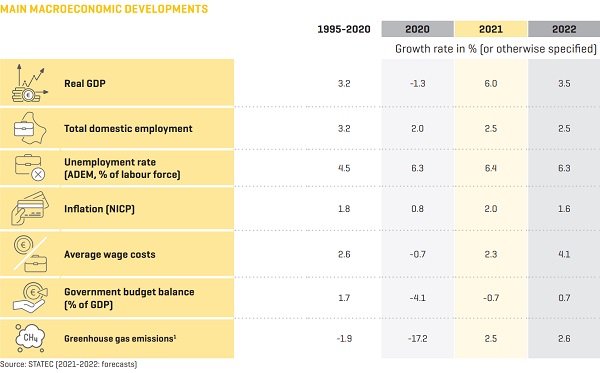 Credit: STATEC
Credit: STATEC
Luxembourg's statistical institute STATEC has estimated that the national economy will grow by 6% in 2021.
In its latest report, STATEC noted that economic activity in Luxembourg suffered a decline in 2020 due to the COVID-19 pandemic, but it seems to have been less serious than in the rest of Europe.
Acceleration of the vaccine rollout makes it possible to envisage a significant reduction in activity restrictions and a strengthening of the economic dynamic from the second half of 2021, in combination with national and international stimulus measures. Luxembourg's GDP is therefore expected to grow by 6% in volume over 2021, followed by a 3.5% expansion in 2022. Over these two years, the market sector is expected to pick up in terms of activity and investment, gradually taking over from public spending, which was significant in 2020.
In addition, STATEC expects inflation in Luxembourg to reach 2.0% this year before slowing to 1.6% by 2022, when the temporary boost from rising oil prices ends.
In 2020, the average wage cost decreased by 0.7% in the Grand Duchy, in line with the trend observed in the eurozone. This decrease was due to the wholesale use of short-time work as the main tool to keep workers employed during this health crisis. Short-time work and other measures have reduced the cost of labour for companies while maintaining the income of employees. For the years 2021 and 2022, STATEC forecasts that wages will follow a more dynamic path (up 2% and then up 4%), higher than that due to automatic indexation alone, their main determinant in the short term, due in particular to the development of labour productivity, which is expected to remain dynamic over the next two years.
Growth in employment is not expected to exceed 2.5%, either this year or in 2022, which is much slower than the growth in economic activity.
The resilience of the Luxembourg economy in the face of the pandemic has also been reflected in the public accounts. Revenue fell only slightly, by about 1% last year, compared with an average drop of 4% for the eurozone. The shock was limited by the good performance of household taxes and social security contributions, as well as by the rapid rebound in VAT revenues after the collapse in the spring of 2020. STATEC forecasts a growth in government revenue of just over 7% per year in 2021 and 2022.
The exceptional increase in public spending in 2020 (up 14%) was largely the result of measures taken to counter the effects of the COVID-19 crisis. However, there has been a significant rise, even when one-off spending and the impact of inflation are discounted. According to STATEC, public spending is expected to stagnate overall in 2021, before increasing by about 4% in 2022.
Luxembourg has a deficit of 4.1% for 2020, which is historic but still the lowest in the whole eurozone. STATEC forecasts that the public accounts will be close to balancing this year (down 0.7%), moving slightly into the black next year.
Moreover, the slowdown in economic activity due to the pandemic has led to a decline in energy imports (fuel, natural gas and electricity). With the lifting of restrictions and the recovery of activity, energy consumption and imports have seen rapid growth, even though this has been limited by the introduction of the CO2 tax on 1 January 2021. After a 17% decrease in 2020, greenhouse gas emissions may increase by about 2.5% per year in 2021 and 2022.
Commented on these projections, Luxembourg's Ministry of the Economy, Franz Fayot, stated: “According to STATEC analyses, Luxembourg has so far been less affected by the COVID-19 crisis than what was feared, and we can only rejoice. This is due both to the solidity of the fundamentals of the Luxembourg economy before the crisis, and to the panoply of support instruments implemented to support businesses and their employees during the pandemic, in particular through short-time work. All of these measures enabled us on the one hand to preserve and stabilise the economic fabric during the crisis, which was our top priority"
The Economy Minister continued: "On the other hand, the 'Neistart' programme is already supporting the post-COVID-19 recovery by subsidising, through extraordinary investment aids, innovation in the form of new production processes, digitalisation, exceedance of environmental standards, efforts made in terms of circular economy. Our roadmap for designing tomorrow's economy in the medium term aims for a transition towards a sustainable, resilient and future-ready economy”.








